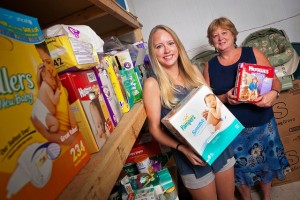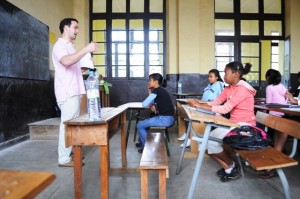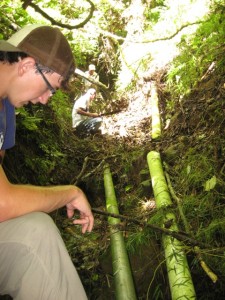For young parents, finding safe and affordable housing can be a challenge. Although shelters are available, many find their rules too restrictive, so they avoid them.

Kristin Anderson ’14 and Deborah Byrd, professor of English, stand in the storage room at the Easton Area Neighborhood Center. As part of their research, they distribute items to expecting and new parents.
Deborah Byrd, professor of English, and research assistant Kristin Anderson ’14 (Newburgh, N.Y.) spent the summer and fall meeting with teens from the Family and Development Research Program, which provides mentoring for pregnant and parenting teens at Easton Area High School. Working with Terry Roman, executive director of the Easton Area Neighborhood Center, they sought to learn how to create shelters that would better suit the needs of these young moms and dads.
“The goals are to find out what kinds of programs, rules, and regulations would be absolutely intolerable and would keep them from using a shelter, which ones would be acceptable, and which ones would be ideal, and why,” Byrd says. “In a tangible way, it could result in the creation of a housing facility that would be well-suited to the needs of these parents and that they would actually use.”
A psychology major, Anderson plans to pursue graduate school and a career in social services. “It’s been really great working with a nonprofit so closely,” she says. “You can see how much these services really make a difference in people’s lives.”
Partnering with community organizations and leaders, locally and globally, to address issues is the goal of the College’s many projects within the Community-Based Learning and Research (CBLR) initiative. CBLR provides the infrastructure to support academic service-learning and community-based research at the College. It enhances the efforts of faculty across all disciplines and allows students to apply what they have learned to work together with communities to solve real-world problems.

As part of Technology Clinic, Brooke Kohler ’13 works at David Due’s fish farm.
“What is truly distinctive about Lafayette is the degree to which our faculty agree that community issues are best addressed through respectful partnerships with community members, which is very different from traditional service-learning that focuses on students ‘helping’ others,” says Hannah Stewart-Gambino, dean of the College. “Our CBLR students learn an appreciation for multidisciplinary approaches, intellectual humility, and practical confidence in working side by side with people from different backgrounds.”
The College will host its annual CBLR Expo 4:15 p.m. Tuesday, April 9, in the Wilson Room of Pfenning Alumni Center. It showcases the ways in which faculty, students, and administrators are partnering with nonprofit agencies, businesses, civic organizations, and local governments to enhance learning and improve communities, locally and around the world.
With the wide variety of experiential learning opportunities available, CBLR is an important part of the Lafayette education. Real-world issues force students to make multidisciplinary connections.
For example, students in the Technology Clinic have been working on a project to help a local fish farm become more economically and environmentally efficient.
The students have been working with David Due at his fish pond in Roseto, Pa., looking at ways to enhance the pond’s mechanisms for aeration, temperature control, and fending off predators. They also are seeking out alternative markets for the fish. This semester, they assessed the viability of supplying to farm-to-table restaurants, forming a recreational fishing pond, and partnering with Bangor Area High School to provide fingerlings to classrooms.
Benjamin Drake ’14 (Spring Lake Heights, N.J.), an electrical and computer engineering major who plans to work in the field after graduation, has found the experience both rewarding and helpful in preparing him for his future career.
“Labs and group projects assigned in class are good experience, but it’s different when there is a customer who will be benefiting from your work, not a teacher giving you a grade,” he says. “I definitely feel this experience has helped me to interact with a team and accomplish a proposed task.”

John Bolton ’12 speaks with Malagasy students as part of LIME.
Community-based learning happens locally, as with the Easton-area projects, but students are also able to make a difference by partnering with communities around the world.
Started in 2010 by Lafayette students under the guidance of David Stifel, associate professor of economics, Lafayette Initiative for Malagasy Education (LIME) is a peer mentoring program that helps Malagasy students navigate the daunting process of applying to U.S. colleges and universities. For the past three winter breaks, a select group of students has traveled to Madagascar to work with students from the Lycee Andohalo public high school. The LIME mentors focus on a variety of skills, including preparing for the SAT and the Test of English as a Foreign Language, filling out admission forms, and practicing English, a third language for most students behind Malagasy and French.
“On the surface, it may seem that we just go to Madagascar to lecture students about the SATs,” says John Bolton ’13 (Darien, Conn.), a mathematics-economics major. “In reality, it’s so much more. We don’t teach the students; we work with them. We aren’t their professors; we’re their friends. It’s important for them to have us as an outlet and resource to practice their English in an informal setting, as this is one of the biggest barriers for them to gain acceptance to a U.S. college or university.”
Since 2006, Lafayette’s chapter of Engineers Without Borders has been working with members of the community of El Convento, Honduras, to build a water treatment and distribution system.
The infrastructure now in place includes a water collection dam, water collection box, water storage tank, three slow sand filters, and two-thirds of the water distribution pipe network.

Kevin McHugh ’15 works with Honduran villagers though Engineers without Borders.
The project earned Lafayette’s chapter the honor of being named a 2013 Premier Project by EWB-USA. It was one of three chapters in the nation to receive the organization’s highest honor.
“The hands-on experience also helps students realize that they can significantly improve the lives of others just by volunteering their skills and energy. The EWB experience hopefully leaves them more aware of the challenges faced by developing countries and maybe with a increased drive to design long-term, sustainable systems for communities in the U.S. and globally,” says chapter adviser Anne Raich, associate professor of civil and environmental engineering.
Other CBLR programs that students have been involved with:
- A database of the Easton Library Company
- Aging and age-related disease
- Supporting local nonprofits through women’s and gender studies internships
- Tax preparation for low-income residents
- Alternative School Break in Haiti
- Engineering education for grades K-12
- Nazareth borough municipal authority geographic information system asset management program
- Bushkill Creek nutrient study
- Pest-control methodologies in the Lafayette Community Garden
- Art therapy with women prison inmates



